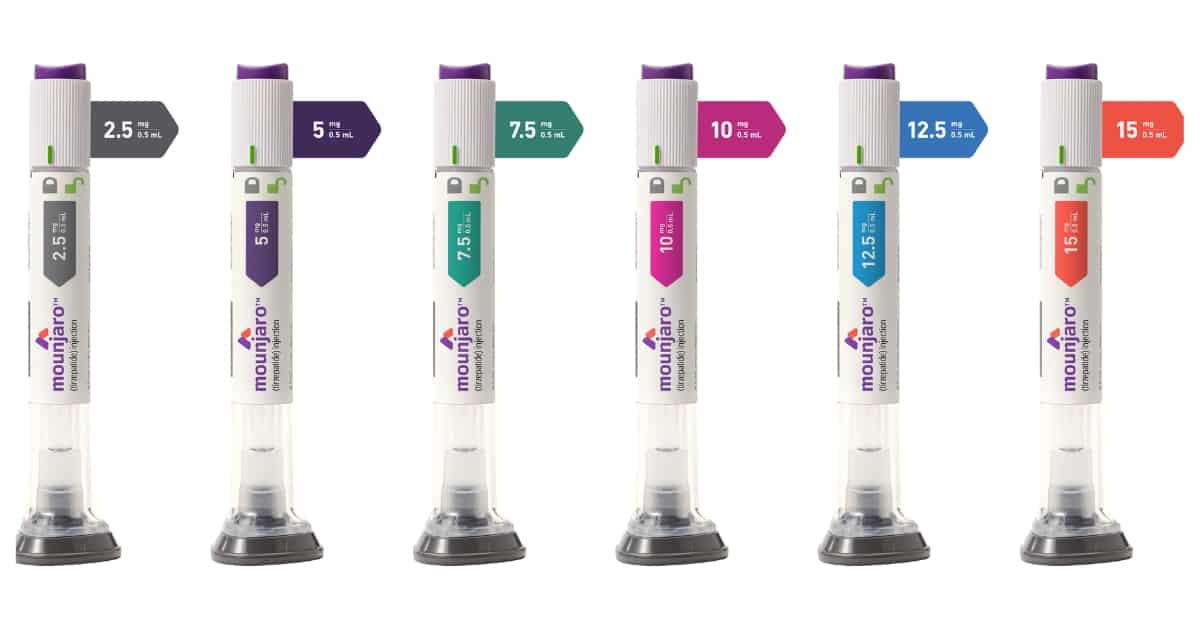Mounjaro is a type 2 diabetes drug that lowers blood sugars, helps improve A1c levels (a measure of glucose control over the previous 2 to 3 months), and assists with weight maintenance.
In this article, we’ll cover everything you need to know about this medicine, including its benefits, side effects, and how to use it effectively.

Key Points:
- Mounjaro is administered as a weekly injection with flexible dosing options to meet individual needs.
- As a first-in-class drug, it uniquely activates both GLP-1 and GIP receptors, providing a new method for managing blood sugar levels.
- In addition to lowering blood sugar and improving A1c levels, it also supports weight loss or maintenance.
Table of Contents
- What is Mounjaro?
- What are the benefits of Mounjaro?
- Why would you be prescribed Mounjaro?
- What are the side effects of Mounjaro?
- Do I need to change my diet?
- Mounjaro doses
- How much Mounjaro do I take?
- What happens if you take too much Mounjaro?
- Can I miss a dose of Moujaro?
- How to inject Mounjaro
- Who shouldn’t take Mounjaro?
- How do I stop taking my Mounjaro?
- What happens when you stop taking Mounjaro?
- Can Mounjaro replace insulin?
- Can I take Mounjaro with other diabetes medications?
- Does Mounjaro need to be refrigerated?
- How much does Mounjaro cost?
- How do I get a prescription for Mounjaro?
What is Mounjaro?
Mounjaro is produced by Eli Lilly and is the brand name for the medication tirzepatide.
It was first approved by the U.S. Food and Drug Administration (FDA) in the United States in 2022 to help manage blood sugar in adults with type 2 diabetes, along with a healthy diet and exercise.
It is the first medication in a new drug class known as dual glucose-dependent insulinotropic polypeptide (GIP) and glucagon-like peptide-1 (GLP-1) receptor agonists, activating both the GLP-1 and GIP receptors.
It works by helping the pancreas produce more insulin, decreasing the amount of sugar released by the liver, increasing the body’s sensitivity to insulin, and slowing digestion, making you feel full longer.
It is an injectable medication taken once per week to help improve blood sugar levels and A1c.
What are the benefits of Mounjaro?
This treatment has three main benefits for people living with diabetes:
Lowers blood sugars
The medicine helps improve blood sugar levels by increasing the amount of insulin the pancreas releases — but only when your blood sugar is rising.
This makes the risk of low blood sugar while taking the medication minimal. It also stops your liver from releasing sugar into the blood and increases your body’s sensitivity to insulin.
Combined, this results in lower blood sugars and A1c levels.
Helps with weight loss or weight maintenance
In November 2023, Mounjaro was approved under the brand name Zepbound for chronic weight management in overweight or obese adults with at least one weight-related condition.
The medicine helps reduce food intake by lowering appetite and slowing digestion.
In clinical trials, people taking the drug at the maximum dose of 15 milligrams (mg) per week lost:
- 12 pounds more than those taking the GLP-1 medication semaglutide
- 29 pounds more than those on insulin degludec
- 27 pounds more than those on insulin glargine
How much weight do you lose on Mounjaro?
In studies on Zepbound, the weight-loss version of Mounjaro, roughly 15 percent of participants taking a 5-mg dose, 32 percent of those taking a 10-mg dose, and 36 percent of those taking a 15-mg dose lost 25 percent of their body weight.
On the highest 15-mg dose, weight loss was an average of 48 pounds, according to the manufacturer.
Read more in: Can Mounjaro Help You Lose Weight?
Lowers risk of heart disease
This medication has the power to protect against heart disease, which is the number one cause of death for people with diabetes.
In studies, after 52 weeks, participants on the highest dose (15 mg per week):
- Lowered their total cholesterol by about 5.6 percent
- Lowered their triglycerides by 22.5 percent
- Lowered their LDL (“bad”) cholesterol by 7.9 percent
- Lowered their VLDL cholesterol by 21.8 percent
- Increased their HDL (“good”) cholesterol by 10.8 percent
Why would you be prescribed Mounjaro?
This therapy is only FDA-approved for people who have type 2 diabetes.
But note that not everyone with type 2 diabetes will be prescribed Mounjaro.
This is because many people are able to manage their blood sugar levels with diet, exercise, and sometimes with other medications such as metformin or insulin.
However, it is a great way to combat insulin resistance, improve blood sugar levels, and aid in weight loss if you’re having difficulty reaching these goals by other methods.
Many people who have type 2 diabetes and existing heart disease may also be prescribed the drug to act as a protective agent and improve both diabetes and heart health.
The medicine is not approved for use in people under 18 years of age.
What are the side effects of Mounjaro?
The most common side effects include:
- Nausea
- Vomiting
- Diarrhea
- Bloating
- Gas
- Stomach pain
- Constipation
- Weight loss
- Rapid heart rate
Although rare, more severe complications may include:
- Thyroid tumors, including cancer
- Pancreatitis (inflammation of the pancreas)
- Gallbladder disease
- Low blood sugar levels, if you take insulin
- Serious allergic reactions
Several of these more severe side effects can lead to permanent health complications and death if not treated quickly.
Call your doctor or seek emergency medical attention if you:
- Develop a fever
- Experience changes or worsening of your vision
- Are feeling weak or in pain after taking the medication
- Think you’re having an allergic reaction
Get a more detailed overview in: Mounjaro Side Effects: What You Need to Know.
Do I need to change my diet?
When taking Mounjaro, adjusting your diet can improve the medication’s effectiveness and decrease side effects.
It’s helpful to avoid foods and beverages high in added sugars, overly fatty, fried, or greasy foods, and to consume alcohol in moderation, or not at all, depending on individual health recommendations.
Focusing on unprocessed, whole foods such as lean proteins, healthy fats, and low-glycemic vegetables can improve the drug’s effectiveness in managing blood sugar levels.
For more detailed guidance, read: What Foods to Avoid on Mounjaro.
Mounjaro doses
This medication comes as a liquid solution inside prefilled, disposable pens. You inject the drug subcutaneously (under your skin) once per week.
You can take the medicine with or without food. Each dose is given in a single-dose pen to prevent overdosing.
The different dosing options available are:
- 2.5 mg per week (for the first four weeks as a starting dose)
- 5 mg per week
- 7.5 mg per week
- 10 mg per week
- 15 mg per week
Maintenance doses can range anywhere from 5 mg per week to 15 mg per week, to be determined by you and your doctor.
Read more: Mounjaro Dosing Guide: How Much Should You Take?
How much Mounjaro do I take?
This will vary by person and will depend on your health history, health goals, and lifestyle.
However, most doctors will start patients on 2.5 mg once per week. It is important to take your injection on the same day each week.
After 4 weeks, if you’re not having adverse side effects, your doctor may increase your dose to 5 mg, administered once weekly.
If you’re still having blood sugar spikes with no adverse side effects, your doctor may increase your dose to 7.5 mg once weekly or as high as 15 mg once weekly. The maximum dose is 15 mg taken once weekly.
Never take two doses within the same week.
What happens if you take too much Mounjaro?
Taking too much of this medication can cause serious adverse side effects.
These can include debilitating nausea, vomiting, diarrhea, stomach pain, and even low blood sugar (especially if you’re also on insulin), which can become fatal if not treated immediately.
Do not take two doses within three days of each other.
Call your doctor right away or seek emergency medical attention if you’ve accidentally taken too much of this medication.
Can I miss a dose of Moujaro?
If you miss a dose, it is OK to take it a few days late.
However, if you missed your dose more than four days (96 hours) ago, just skip that week’s dose and take your next regularly scheduled dose on time.
You will not experience insulin resistance or weight gain from one missed dose.
Try not to miss doses regularly, however, as the medication is most effective when taken consistently.
How to inject Mounjaro
- Check the liquid in the pen visually before injecting.
- Do not use the pen if there are any particles or discoloration present.
- Before injecting, clean the injection site with a rubbing alcohol swab.
- Change the injection site each week to prevent injuries under the skin or scar tissue from developing.
- Note that this medicine is typically injected under the skin in the thigh, abdomen, or upper arm.
- Talk to your doctor about the best places for you to inject and how to rotate injection sites.
- Always throw the pen needle and pen away after each dose in a sharps-safe container.
Since the pens come in single doses, you will go through four per 30-day supply, so there is no need to keep the pen after use.
Learn more in: Mounjaro Injection: Where and How to Inject.
Who shouldn’t take Mounjaro?
Needless to say, do not take this if you don’t have a prescription.
It is not recommended for use if you are pregnant, planning on becoming pregnant, or if you are breastfeeding.
It is also not recommended for people without diabetes, with prediabetes, or with type 1 diabetes without the guidance of a physician.
Learn more in: Can You Take Mounjaro if You Have Type 1 Diabetes?
This medication is only FDA-approved for people 18 years and older.
Do not use it if you or any of your family members have ever had medullary thyroid carcinoma (MTC), or if you have Multiple Endocrine Neoplasia syndrome type 2 (MEN 2).
Do not use it if you are allergic to tirzepatide or any of the other ingredients in the medication.
Talk with your doctor if you have questions or concerns about starting this therapy.
How do I stop taking my Mounjaro?
There are a number of reasons that you may want to stop taking this medicine.
For example, maybe you’re experiencing adverse side effects, you don’t like how the medication makes you feel, or it’s gotten cost-prohibitive.
Talk with your doctor before stopping any diabetes medication, including this one.
What happens when you stop taking Mounjaro?
Your doctor will probably want you to wean your dose before stopping it completely. Insulin resistance, food cravings, blood sugar levels, and weight may creep back up once you stop taking it.
You will want to have a plan in place, such as an alternative medication, exercise, or diet regimen, to help combat any rebound effects you may experience.
If you have lost weight on this medicine, you may need to keep taking it indefinitely to prevent the weight from coming back.
Can Mounjaro replace insulin?
No. It is not insulin, nor is it an insulin replacement. Rather, it acts as a supplement to insulin therapy (if you take insulin).
If you’ve recently been prescribed this medicine, do not stop taking your other diabetes medications unless your doctor has specifically told you to.
Mounjaro lowers blood sugars over time, but it does not cause acute low blood sugars in the way that insulin can.
If you normally take insulin for food, you will need to continue to do so.
If you’ve been on the medication for several months, you may notice that your insulin needs are gradually decreasing.
However, this rarely completely takes away the need to take insulin for your diabetes.
Can I take Mounjaro with other diabetes medications?
This will depend on what other medications you’re taking.
Generally, Mounjaro can be taken alongside medications like metformin and/or insulin, if prescribed at the same time.
However, it should not be combined with GLP-1 receptor agonist medications.
GLP-1 receptor agonists include:
- Exenatide (brand names Byetta, Bydureon)
- Liraglutide (Victoza)
- Dulaglutide (Trulicity)
- Semaglutide (Ozempic)
- Lixisenatide (Adlyxin)
Always talk with your doctor if you’re unsure of how any medications you take will interact with any new medications you’re considering taking.
Read more about how Mounjaro compares to Ozempic in: Ozempic vs. Mounjaro: Which One Should You Choose?
Does Mounjaro need to be refrigerated?
No. The medicine can be left unrefrigerated for up to 21 days, as long as the temperature never exceeds 86 degrees Fahrenheit (30 degrees Celsius).
Mounjaro should be stored at a temperature between 36 and 46 degrees Fahrenheit (2 and 8 degrees Celsius).
Make sure it does not get any hotter than 86 degrees Fahrenheit (30 degrees Celsius), and never freeze the pens.
Always keep your Mounjaro pen in its original casing to protect it from sunlight.
How much does Mounjaro cost?
The cost of Mounjaro can vary depending on your insurance coverage and specific plan details.
To determine your specific co-pay or out-of-pocket costs, you can use your prescription or medical card with the Mounjaro coverage and co-pay calculator available through your insurance provider.
If you have questions about coverage or co-pay costs, you can contact Mounjaro customer support at 1-800-545-5979.
For those who qualify, Eli Lilly offers a Mounjaro Savings Card program that may provide free medication. To learn more about this program and see if you are eligible, call Eli Lilly’s PAP toll-free at 1-800-545-6962.
How do I get a prescription for Mounjaro?
If you have type 2 diabetes, speak with your doctor if you want a prescription for this medication.
If you don’t have type 2 but live with another form of diabetes and are dealing with insulin resistance, talk with your doctor about your treatment options.
Also speak with your doctor if you do not have any type of diabetes but are looking to safely lose weight. There are FDA-approved weight loss medications that may be a good fit and won’t have the same side effects as Mounjaro/Zepbound.
For example, Wegovy (semaglutide) is FDA-approved for weight loss in adults who are obese or overweight and have at least one weight-related condition (such as type 2 diabetes, high blood pressure, or high cholesterol).
Did you find this article helpful? Click Yes or No below to let us know!






Margaret couch
I will b having surgery in a few months should I remain from taking the week before. Also I won’t b able to take for several weeks so will it b ok to start back on same schedule
Donna Witkoski
Excellent article! Everything you need to kno is right here!
Patti
Before I started taking Mounjaro I was taking 70 mg of insulin a day and my A1C was at 8.3. For my age my doctors goal for me was getting me down to 17 mg of insulin and an A1C at 6.5. Now after taking Mounjaro for 6 months, I’m on the 10 mg, my insulin is down to 15 mg a day and my A1C is at 6.1. And I lost 20 lbs. I am so glad my doctor put me on Mounjaro. I’m learning to eat better and slower. Thank you so much Lilly.
Darren
@ Barb Fort-I too have noticed a reduction in bathroom trips. I have been taking Mounjaro for a little over a year. I started at 5mg and am currently on 10. My a1c was 8.9 and I weighed 250 lbs on insulin. My a1c is now 5.6, I weigh 185 lbs, and I no longer take insulin. Also, my blood pressure is down and my cholesterol is normal. I am employed, so my health insurance covers the costs. I think Mounjaro is a true ‘miracle drug”, if you can get it.
Geri F Hansford
I have been on Mounjaro for about six months. I have lost over 35 pounds which is pretty normal. i started weighing 165 and am now down to 130. I don’t have much of an appetite which is the only thing I don’t like about this drug. Luckily, I have not had any adverse side effects at all! YAY! Except for the appetite loss (I love to eat) I would, and have, recommended this to my friends who have diabetic issues.
I use a mail in pharmacy suggested by my health insurance provider so I always have an ample supply.
Andrea
I have been taking Mounjaro for about a year (I stopped for 2-3 months because of cost issues) My A1C at its Highest was 10.6, my weight 299 pounds, BMI 44.1. my last A1C was 6.0, my weight 225 pounds, BMI 33.2. I am currently on 7.5mg. I also take Metformin. I was taking Synjardy (Jardiance and Metformin combo pill) but was recently changed to straight metformin. The biggest issue I have had is cost. Another benefit I have noticed (besides weight loss) is my cholesterol levels are normal, less than they have been in 20 years!
Barb Fort
Has anyone found that Mounjaro has dramatically improved their over active bladder? It could be because my A1C is at it’s lowest 5.5. I’m still drinking a lot of water. Could it indicate a kidney problem? I’m thrilled to not have the frequency and urgency, but concerned since the medication is relatively new. I’m going to make an appointment with my urologist.
Carol Workman
This is a great medication if you can get it. I have been unable to find any pharmacy with this medication available. I have tried for two weeks to get my refill. I take this medication due to having Type 2 diabetes. The manufacturer developed this medication first for Type 2 diabetes and people with Type 2 diabetes should be given the medication first before weight loss without diabetes!!
Christel Oerum
That is frustrating! I’ve had luck with finding some “sold out” medication at small specialty pharmacies (many will ship you the medication if you don’t live close). Might be worth a try
Jennifer
Also try mail order pharmacy.. they often have it when local pharmacies don’t
Geri F Hansford
As I stated in my comments above, I use a mail-in pharmacy and have not had any issues. But I sure do agree with you 100%, those who are using it for weight loss should not be able to get it. There are other weight loss medications out there. I understand that Mounjaro has a new medication similar that is approved by FDA for strictly weight loss. Zepbound, the weight-loss version of Mounjaro. Good luck in your search!